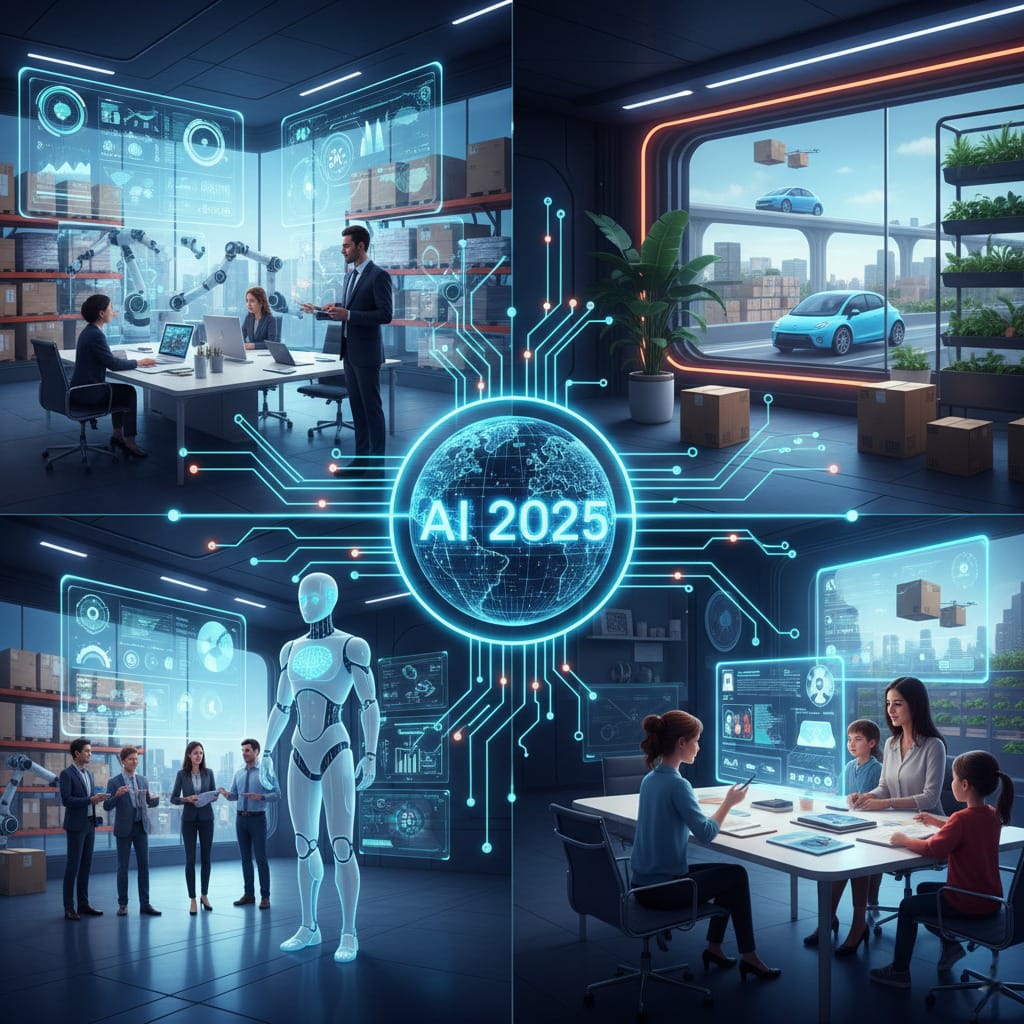Artificial Intelligence (AI) is revolutionizing the way we live and work. In 2025, AI is no longer just a futuristic concept it has become an integral part of business operations, personal productivity, healthcare, education, and everyday life. From generative AI tools to advanced automation, understanding AI's applications, benefits, and ethical implications is essential for staying ahead in a competitive, technology-driven world.

Explore how AI is transforming businesses and daily life in 2025
1. Evolution of AI and Its Current Landscape
AI has evolved from rule-based systems to machine learning, deep learning, and generative AI. Today, AI algorithms can understand natural language, generate images and text, recognize patterns, and make predictive decisions. In 2025, businesses are leveraging AI for efficiency, cost reduction, personalization, and innovation.
1.1 Generative AI
Generative AI creates original content such as text, images, music, or videos based on input prompts. Tools like ChatGPT, DALL·E, and AI video generators are widely adopted for marketing, design, and content creation. Generative AI saves time, enhances creativity, and enables small businesses to produce professional-level content without large teams.
1.2 AI in Everyday Life
- Smart assistants like Alexa and Google Assistant automate daily tasks.
- AI-powered recommendation engines in e-commerce, streaming, and social media.
- Healthcare applications like AI-driven diagnostics, patient monitoring, and personalized treatment plans.
- Smart homes and IoT devices learning user behavior for convenience and energy efficiency.
2. AI Transforming Businesses
Companies across industries are integrating AI to optimize operations, improve customer experiences, and drive innovation. Here's how AI is reshaping business:
2.1 Marketing & Customer Engagement
- AI-driven personalization for email campaigns, ads, and website experiences.
- Chatbots and virtual assistants for 24/7 customer support.
- Predictive analytics to forecast customer behavior and optimize campaigns.
2.2 Operations & Supply Chain
- AI-powered demand forecasting for inventory management.
- Automated logistics and warehouse operations using robotics.
- Process optimization to reduce costs and improve efficiency.
2.3 Product Development & Innovation
- AI-assisted research and development for faster prototyping.
- Predictive analytics to identify market trends and customer needs.
- Generative AI for creative content, design, and product simulations.
3. AI in Healthcare
AI is revolutionizing healthcare by enhancing diagnostics, treatment planning, and patient care.
- AI-powered imaging for faster and accurate diagnosis.
- Predictive analytics for disease prevention and outbreak tracking.
- Personalized medicine based on genetic and lifestyle data.
- AI-driven virtual health assistants for patient guidance and support.
4. AI in Education
The education sector is embracing AI to provide personalized learning experiences, improve engagement, and automate administrative tasks.
- Adaptive learning platforms to customize lessons according to student performance.
- Automated grading and feedback systems for teachers.
- AI tutors and chatbots to assist students 24/7.
- Data analytics to track learning outcomes and improve curriculum design.
5. AI Ethics & Challenges
Despite its potential, AI comes with ethical considerations and challenges:
- Data privacy and protection concerns.
- Bias in AI algorithms leading to unfair decisions.
- Job displacement and workforce transformation.
- Ensuring transparency, accountability, and compliance with regulations.
6. Future Trends in AI (2025 and Beyond)
- Generative AI for advanced content creation and problem solving.
- Integration of AI with IoT, robotics, and AR/VR for immersive experiences.
- AI in climate tech for environmental monitoring and sustainability.
- Advanced natural language processing for seamless human-computer interaction.
- AI-driven cybersecurity for proactive threat detection and prevention.
7. How to Adopt AI in Your Business or Daily Life
- Start with AI tools for productivity, automation, and data analysis.
- Train employees to use AI solutions effectively.
- Collaborate with AI solution providers and consultants for tailored implementation.
- Focus on data quality and ethical usage of AI systems.
- Continuously monitor AI performance and optimize for best results.
Conclusion
AI in 2025 is transforming the way we work, learn, communicate, and live. Businesses, healthcare providers, educators, and individuals who embrace AI ethically and strategically will gain a competitive edge. Understanding AI applications, emerging trends, and challenges is crucial to harness its full potential for innovation and growth.
🎯 Key Takeaways
- AI is transforming businesses, healthcare, education, and daily life globally.
- Generative AI, predictive analytics, and automation are key technologies in 2025.
- AI adoption requires attention to ethics, privacy, and fairness.
- Businesses can leverage AI to improve efficiency, personalization, and innovation.
- Staying updated with AI trends ensures long-term growth and competitiveness.